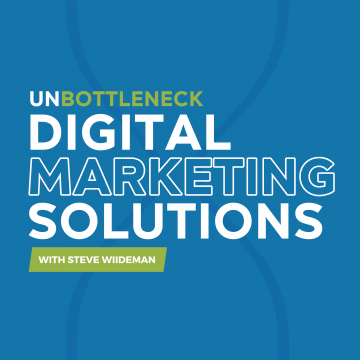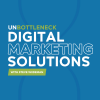Podcast: Play in new window | Download
In this episode of the Unbottleneck Podcast, Steve Wiideman is joined by e-commerce expert Kevin Indig to discuss how to set up and optimize your Shopify or online market space with best practices that lead to success.
About Our Guest: Kevin Indig
Kevin Indig is Director of SEO at Shopify. He has helped companies acquire over 100 million users in the last 10 years. He was recognized as a “Top SEO expert in 2020 and 2021” by Search Engine Journal and is a Judge of the European Search Awards.
Sponsored by Ryte
Featured in this episode:
- Essential Shopify Tips
- Identifying as a Utility or Brand?
- Thinking Beyond the English Language
- Choosing Your SEO Team
3 Shopify SEO Tips You Need to Know
The great thing about Shopify is that it provides a seamless way to take your business online! When approaching eCommerce, you should give it the same level of care and customer service that you would expect in a physical store.
Here are some helpful tips that will help you to better serve users and optimize for SEO:
- Optimize Your Product Page
Be informative! Many merchants make the mistake of simply copying and pasting product descriptions without much thought. Create unique product descriptions for each page and provide all the relevant information that a customer would need before making a purchase (ex. size chart, fit, material, etc)
- Frequently Asked Questions (FAQs)
Provide FAQs on category pages with FAQ markup to help Google understand that it is specifically a question. This can be a great way to get a featured snippet answer in the search results for a relevant query.
- Leverage Your Blog
Blogs are a great way to provide additional information about a product beyond the product page. If a user is not yet ready to make a purchase, you can provide guides, tutorials and interviews that can link back to the product page.
Identify Yourself: Are You a Utility or a Brand?
Sometimes small business owners can embrace the harmful habit of solely focusing on their bottom line, while neglecting branding efforts. This mentality is counterproductive because when you don’t focus on customers, there is no sustainability or growth in your business. Just like plants have to be watered and nurtured, your business needs the same care and attention.
As a business owner, you have to ask yourself, Do I want to be a utility or a brand?”.
If you’re just a utility, then you don’t matter as much because people can get your product from anywhere. In the end, there is nothing that sets you apart from your competitors.
If you’re a brand, then you provide an identity and a story that brings people in and makes their purchases more meaningful.
When you operate as a brand rather than a utility, you open yourself up to more opportunities for soft conversations if people are not ready to purchase from you yet. Soft conversions are a great way to keep your audience engaged with future content through email opt-ins or even blog subscriptions. But you never want to miss an opportunity to nurture your customers throughout the buyer journey.
Thinking Beyond the English Language
American business owners have a great opportunity to reach more people by optimizing their websites for different languages and cultures. Even though English is the dominant language in the USA, this country is still a melting pot of different cultures, and for many people, English is not their first language.
Incorporating different languages is not just about words, but expression. For example, Chinese languages are very descriptive where one word can be a reflection of another. By understanding language, you can begin to understand culture and use it as a way to provide a seamless shopping experience for more people.
Pro-Tip: You can start small by using paid ads to drive traffic to these pages and if you get great results from it, then start incorporating it into your organic strategy.
Choosing the Right Type of SEO Professional
As business owners begin to get acclimated to the idea of SEO, they may want to consider hiring an SEO expert or agency to manage it.
In the SEO industry, there are people who may declare themselves as an analyst, strategist or consultant so it is important to know the difference between each of these roles. By understanding these key differences, you can make an informed decision about which SEO expert or agency is the best fit based on your business objectives.
An SEO analyst serves as an accountant who tells you how your channel is performing by assessing strengths and weaknesses (i.e quality assurance).
An SEO strategist creates strategies for the future of your business and presents growth opportunities to go after.
An SEO consultant is an outsider who brings in new ideas and fresh perspectives while addressing roadblocks along the way.
We encourage you to further dive into these roles as you assess your SEO goals!
Keep up with the latest in e-commerce SEO and digital marketing strategies. Follow Steve on LinkedIn!




